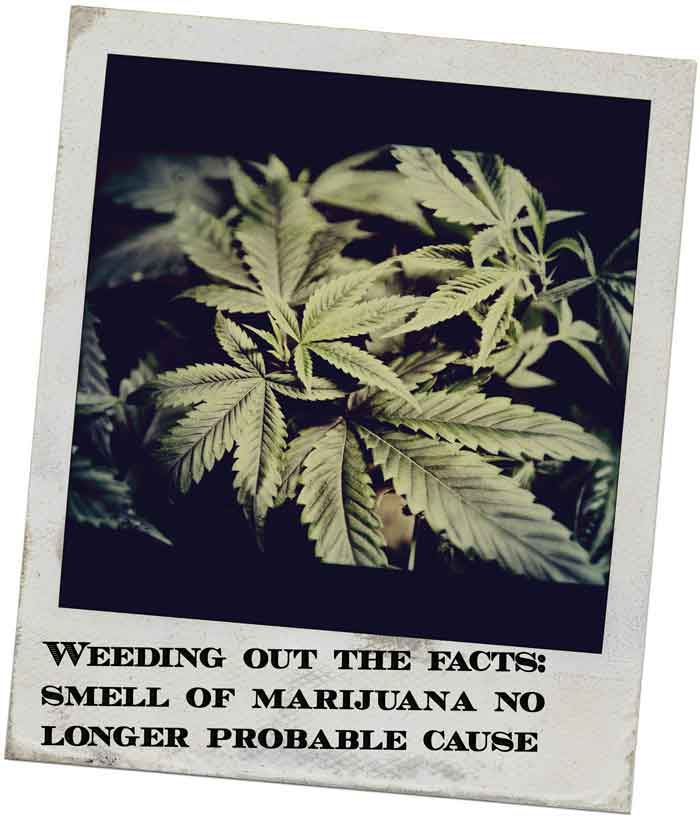
You may have heard by now that Judges in the Arizona Court of Appeals, Division 2, reversed and remanded a 2013 marijuana possession case, due to an illegal search warrant and found that the smell of marijuana alone does not constitute probable cause for a search warrant. While the rumors have begun to swirl about what this means for Arizona, there are some people out there that are viewing this as a blanket win for marijuana users. This is not the case, even though Arizona is still on its way to being as progressive as other “green states.” We’d like to go over what this really means for marijuana users in Arizona and outline some important points that all marijuana users should remember while living in Arizona.
The decision in State of Arizona v. Ronald James Sisco II came about after Ronald J. Sisco II was charged and convicted with possession of drug paraphernalia, possession of marijuana for sale, child abuse and production of marijuana. Mr. Sisco was an occupant of a four-unit complex in Southern Tucson, when Tucson Officers discovered an “overpowering” odor of marijuana coming from his building. These officers obtained a search warrant based on this smell alone. Upon entry into the complex, they discovered 357 plants and 53 pounds of cultivated marijuana. After Mr. Sisco went to trial and was found guilty, he appealed his case based on an illegal search warrant, stating that smell alone does not condone criminal activity after the 2010 Arizona Medical Marijuana Act (AMMA).
In June of 2016, the Court of Appeals, in a split decision, ruled in favor of Mr. Sisco’s appeal. Judge Peter Eckerson, the chief Judge presiding over this case, stated that since AMMA, medical marijuana use is legal, and the smell of marijuana alone does not condone illegal activity. He stated that “a reasonable, prudent and cautious person could not, in the absence of further information, form a well-founded belief that a criminal offense was committed.” He called for an “odor-plus” practice to be used by law enforcement, which necessitates more probable cause than just smell alone. Judge Eckerson went on to note that, if officers were basing their suspicion of illegal activity on smell alone, it makes medical marijuana patients, “second class citizens, losing their rights to privacy and security, including privacy within their own homes.” After this decision, much to the lament of the State, marijuana users everywhere have counted this as a huge win for marijuana law reformists. However, there are some facts that have been left out of the conversation. That is to say, there are clearly situations where odor alone does, in fact, still serve as the basis for a search. We’ll teach you why and help you weed out the facts below!
- The Arizona Medical Marijuana Act (AMMA) effects determinations of probable cause. The Act renders possession, cultivation and use of marijuana lawful under some circumstances. These circumstances, not possession itself now determine whether such activity is criminal.
- AMMA and this new ruling are limited. Arizona still does not allow the use of marijuana in public or the use of marijuana while driving. Also, it is important to have a valid, not expired, medical marijuana card on hand at all times, to show that you are using marijuana legally.
- In circumstances of DUI, as the odor of alcohol is indicative of alcohol impairment, the odor of marijuana is indicative of marijuana ingestion and can be used as the basis for an investigatory stop and/or a search warrant if the officer suspects impairment.
- The holding in Sisco does not apply to border checkpoints.
- Probable cause can arise when the scent of marijuana is coupled with additional, commonly evident facts or contextual information suggesting a marijuana-related offense. For instance, if someone is smoking a joint in a public place, then officers would be able to see illegal drug use, and smell marijuana.
- If an officer smells marijuana, they could still ask consensual questions of a suspect, and, based on that suspect’s statements, could have sufficient evidence for a search warrant. That is why it is very important not to make any statements, if you believe you are under investigation of a crime.
- Until and unless this ruling is overturned by the Supreme Court, odor alone won’t provide the basis for searches. However, this ruling could be overturned or limited to its facts.
- Given the recency of this ruling, officers may still operate under the premise that marijuana is illegal under all circumstances. They may have developed practices in accord with a now outdated assumption. That is why it is extremely important to hire a defense attorney that is familiar with the current legislation.
If you are in need of an attorney who is experienced with marijuana related crimes, call Cindy at Castillo Law today! She is available 24/7 at 480-206-5204 or by filling out our contact form here.

